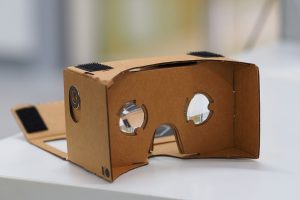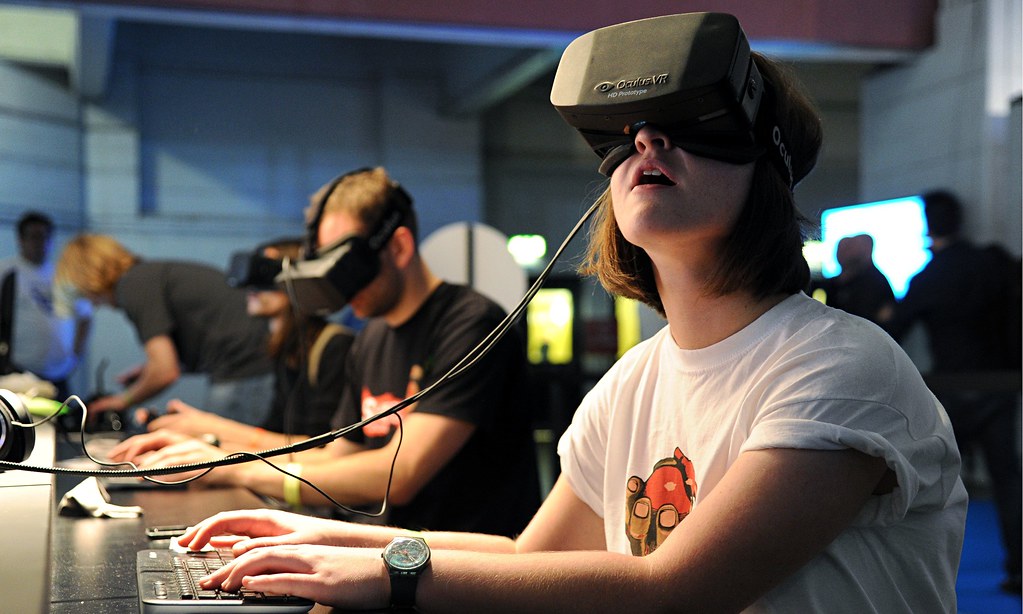Henry (or How VR will Undermine the Cinematic Experience)
On September 8th, Henry, a short film about a hedgehog who loves to cuddle, won an Emmy for “Outstanding Original Interactive Program,” making it the first original virtual reality film to win a major award.
Video 1: Henry’s Premiere from Story Studio, Vimeo
A Short History of VR
This may be the first award won, but VR is not new. It’s origins trace back to the 1950’s with the invention of the ‘Sensorama,’ a device used in interactive theatre experience. The ‘Sensorama’ consisted of an enclosed booth inside of which had a rotating chair and a viewing screen onto which stereoscopic images (Virtual Reality Society, his.) were projected. The multimedia elements included oscillating fans, audio speakers, and a device that gave off scent. (Virtual Reality Society)
Video 2: Morton Heilig’s Sensorama (Interview) Youtube
While the earliest prototype of VR devices was created for entertainment purposes, the potential of virtual reality in other areas was quickly recognized. VR content was produced for cartography, NASA, and research for human-computer interaction (HCI) in the 1980s. (Virtual Reality Society)
Nearly 70 years after it’s inception as a form of entertainment, VR has returned to the Hollywood arena. This Emmy win is surely the first of many to come, and VR is likely to leave a permanent change on film and digital storytelling.
VR as a Product
Upon Googling “virtual reality,” headlines appear naming 2016 the “Year of VR.” (2016: The Year of VR?, Is 2016 The Year of Virtual Reality?, Virtual reality (VR): a billion dollar niche (TMT Predictions 2016), 2016: the year when VR goes from virtual to reality) What seems to be the biggest change in the public discussion of virtual reality in 2016 is that it has stepped down from its mystical sci-fi-esque pedestal through the development and release of low-cost devices such as the Google Cardboard or the (less low-cost) Oculus Rift. VR products are entering into the market at a relatively affordable price. Soon you too can own your own Oculus Rift head set for the low low price of (ok, still not that low…). And it’s only a matter of time before devices such as the Oculus Rift are as ubiquitous as the Xbox.

Image 1: The Google Cardboard VR Mount
These devices are commercializing virtual reality, democratizing it for the consumer. And the same tech companies that are producing these VR devices are also creating the VR content.
Facebook & Oculus
Henry was created by Oculus Story Studios, the same makers of the Oculus Rift. (Matney) In 2014, Facebook purchased Oculus VR for $2 billion (Dredge) at a time when Oculus was known for their focus on video gaming.
In a Facebook post announcing the acquisition on March 25th, 2014, Mark Zuckerberg wrote:
“Immersive gaming will be the first, and Oculus already has big plans here that won’t be changing and we hope to accelerate… But this is just the start. After games, we’re going to make Oculus a platform for many other experiences. Imagine enjoying a court side seat at a game, studying in a classroom of students and teachers all over the world or consulting with a doctor face-to-face — just by putting on goggles in your home.” (Zuckerberg)
He predicts VR’s potential to take the consumer’s mind anywhere, while leaving their body behind. Soon, you’ll be able to go to the movies without ever stepping foot in a movie theatre again. And Facebook will have a hand in what you’re watching, despite Zuckerberg’s recent claims that Facebook is “a technology company. We’re not a media company.” (Gilbert)
The Potential Costs of VR & the Cinematic Experience
The potential of new technology to change aspects of our lives, presumably for the better, is exciting, and keeps us pushing forward and innovating. Trips to the movie theater are expensive and often uncomfortable. Cinemas represent an outdated mode of entertainment – why pay $15 to see a movie (and another $10 on a small popcorn) when you can stream Netflix to your home for $9/month?
Yet people still go to movies. Cinemas are symbols of Hollywood and film nostalgia. Going to the cinema is a social event, a place to visit with your friends, family or on a date. VR and augmented reality are largely individual experiences. Sure, through Pokémon Go you can stampede over other people also chasing after a Vaporeon, but the entertainment experience itself is built around an individual one. It’s difficult to be social when your eyes are glued to your phone. Even more so inside a head-mounted device.

Image 2: Oculus Rift Headset
Henry, the cute story of a hedgehog whose hugging habits endanger the lives of his balloon animal friends, is certainly the first VR Emmy nomination to come of many. The potentiality of VR to allow a new level of empathy with audiences through storytelling is enormously exciting. But with new technology, it’s important to remind ourselves of what we are giving up. Will the cinematic experience be turned into one as socially isolating and (arguably) damaging as video and computer games? (Zamani, et al.) VR is something that was created for entertainment, and is now returning home. But will it destroy the medium that it is meant to enhance? What will happen to the social institution of cinema?
References
Dredge, Stuart. “Facebook Closes Its $2bn Oculus Rift Acquisition. What Next?” The Guardian. Guardian News and Media, 22 July 2014. Web. 18 Sept. 2016. <https://www.theguardian.com/technology/2014/jul/22/facebook-oculus-rift-acquisition-virtual-reality>.
Gilbert, Ben. “Facebook Refuses to Accept It’s a Media Company – Here’s Why That’s Terrible for You.” Business Insider. Business Insider, Inc, 30 Aug. 2016. Web. 18 Sept. 2016. <http://uk.businessinsider.com/why-facebook-is-a-media-company-even-though-it-says-its-not-2016-8?r=US&IR=T>.
“History Of Virtual Reality – Virtual Reality.” Virtual Reality Society. N.p., 10 Jan. 2016. Web. 18 Sept. 2016. <http://www.vrs.org.uk/virtual-reality/history.html>.
“How Did Virtual Reality Begin? – Virtual Reality.” Virtual Reality Society. N.p., 10 Jan. 2016. Web. 18 Sept. 2016. <http://www.vrs.org.uk/virtual-reality/beginning.html>.
Matney, Lucas. “Oculus Wins Its First Emmy for Virtual Reality Short Film ‘Henry’.” TechCrunch. N.p., 08 Sept. 2016. Web. 18 Sept. 2016. <https://techcrunch.com/2016/09/08/oculus-wins-its-first-emmy-for-virtual-reality-short-film-henry/>.
Zamani, Eshrat, Ali Kheradmand, Maliheh Cheshmi, Ahmad Abedi, and Nasim Hedayati. “Comparing the Social Skills of Students Addicted to Computer Games with Normal Students.” Addiction & Health. Kerman University of Medical Sciences, 2010. Web. 18 Sept. 2016. <http://www.ncbi.nlm.nih.gov/pmc/articles/PMC3905509/>.
Zuckerberg, Mark. Facebook. Facebook, 25 Mar. 2014. Web. 18 Sept. 2016. <https://www.facebook.com/zuck/posts/10101319050523971>.